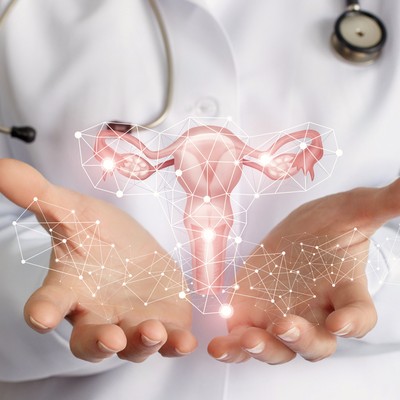

What You Need To Know About Having A Hysterectomy
Firstly, what exactly is a hysterectomy?
“Hysterectomy means the surgical removal of the uterus, i.e. the womb. It is the most common gynaecological operation and over 60,000 hysterectomies are performed each year in the UK. More than one-third of women have had a hysterectomy by the age of 60.” – Dr Shaheen Khazali, consultant gynaecologist and laparoscopic surgeon at The Lister Hospital, part of HCA Healthcare UK
Are there different types of hysterectomies?
“Yes, there are different forms of surgery depending on your reason for it, your gynaecological history and your age. A total hysterectomy involves removing your uterus and the neck of your womb (cervix) but usually leaves your ovaries. If the ovaries are removed, this is referred to as a total hysterectomy and bilateral salpingo-oophorectomy (BSO). A subtotal hysterectomy involves removal of your womb but not your cervix, while a radical hysterectomy (also called Wertheim’s hysterectomy) involves removing your womb, cervix, fallopian tubes and ovaries, part of the vagina and lymph glands. This operation is usually done as part of cancer treatment.” – Dr Samantha Brown, menopause specialist and co-founder of The Bronte Clinic
And are there different ways to perform these surgeries?
“A hysterectomy is either done via keyhole surgery, via the stomach (abdominal) or via the vagina. The procedure is increasingly being performed via keyhole due to the benefits, which include smaller scars, less pain and less bleeding after the operation, as well as a shorter hospital stay and faster recovery. This is also referred to as laparoscopic or robotic-assisted hysterectomy. A surgeon is also able to see more clearly due to the magnification offered by the laparoscope of the robot used in keyhole surgery. An abdominal hysterectomy is the old way of doing this operation where a cut is made on the tummy, either on the bikini line or through an ‘up and down’ incision. This is the most invasive way to perform the operation and should be avoided where possible – recovery is longer, pain is more severe and the scar is larger. A vaginal hysterectomy is less invasive than an abdominal procedure and may be the preferred option if someone is suffering from a significant prolapse.” – Shaheen
What are the most common reasons for having a hysterectomy?
“One of the most common reasons for having a hysterectomy pre-menopause is heavy periods or very painful periods, especially if other treatments have failed. It may be that your heavy periods are causing anaemia and difficulty in your day-to-day life. A hysterectomy is also a solution for endometriosis, a condition where the cells which line the womb are found outside the womb in the pelvis; as well as fibroids, a benign swelling of the muscle that grows in the womb, putting pressure on your bladder. Symptoms of fibroids include pain and heavy periods. The procedure may also be carried out if you are experiencing genitourinary prolapse, which occurs when the womb or parts of the vaginal wall drop – this can happen after the menopause. A hysterectomy will also be advised if you develop any gynaecological cancer, such as cervical, uterine or ovarian cancer, or cancer of the fallopian tubes.” – Samantha
How common is a hysterectomy after the age of 50?
“Statistics show 30-35% of women aged 55+ will have a hysterectomy. The most common reasons for women in this age group are driven by post-menopausal changes, including fibroids that haven’t shrunk with the menopause, uterine prolapse, endometriosis and uterine cancer.” – Dr Fiona MacRae, expert in women’s health and BHRT at The Marion Gluck Clinic
How can you prepare your body for surgery?
“Get as fit as possible, ensuring a nutritious diet and try to reduce or eliminate alcohol entirely for at least six weeks ahead of surgery. If you smoke, it’s also important to limit this as much as possible – ideally giving up – at least six weeks prior to the operation. All patients will be given a preoperative assessment, where advice will be given regarding preparation and recovery. It’s important to understand what your surgery may look like – a vaginal hysterectomy may be performed as a day case whilst an abdominal surgery will almost certainly require an overnight stay. At the pre op clinic, a full blood count – reflecting your iron, vitamin B12 and folate levels – will be taken, as well as an assessment of your renal function.” – Fiona
What about recovery?
“It does depend on the route the hysterectomy is performed, and recovery varies from person to person. Some women are able to go for a short walk after a few days, while other women are able to go back to work after a couple of weeks. For others, it can take up to six weeks. Following surgery, you may have some light vaginal bleeding for one to two weeks and can expect pain and discomfort in the lower abdomen for the first few days. You should refrain from sexual intercourse for six weeks to allow the stitches in the top of your vagina to heal.” – Shaheen
“Recovery is a blend of movement and rest, as well as increased calories, including plenty of lean protein, nutritious vegetables, as well as plenty of fruit for vitamin C. Supplements such as zinc, vitamin E and vitamin B complex may also help promote healing.” – Fiona
How do your hormones change after surgery?
“If you have your ovaries removed, blood hormone levels will plummet post-surgery, causing surgical menopause. It is important to replace oestradiol, progesterone and testosterone for optimal wellbeing, although only oestradiol is prescribed on the NHS. While this is likely to help with hot flushes, a private clinic will be able to prescribe other hormones. Even in women who do retain their ovaries, the surgery can still trigger menopause and hormonal supplementation is desirable.” – Fiona
Do you always need to take HRT after a hysterectomy?
“There are many advantages to taking HRT post-surgery, and for most women the benefits will outweigh the risks. HRT can help with certain symptoms that can impact your wellbeing, work and relationships, but there are also long-term benefits to taking HRT. For example, it can reduce cardiovascular risk and improve bone health. The younger you are, the more important these long-term benefits are. If you’re in surgical menopause younger than the age of 50, you would be encouraged to take HRT at least till the natural age of menopause (51).” – Samantha
Will having a hysterectomy affect your sex life?
“If your ovaries have been removed, you may experience a lower sex drive, but if you decide to take HRT and replace deficient hormones, most women do revert to the sex drive they had prior to surgery. Some women experience an enhanced sex drive, too. On the other hand, if a hysterectomy was done to treat a condition that was causing discomfort or pain during sex, it’s likely your sex life will be improved as a result of surgery. The same applies to women who have very heavy and prolonged periods. However, the data of the impact of hysterectomy alone on a woman’s sex life is conflicting and lacking.” – Shaheen
Are there any non-surgical alternatives to a hysterectomy?
“For conditions like fibroids and endometriosis, there are alternative treatments, explaining why it’s always important to understand your situation when considering surgery. For example, if it’s for heavy bleeding, there are medications you can take to reduce the bleeding, or you could have an endometrial ablation, which freezes or burns the uterine lining. If you are dealing with fibroids, meanwhile, there is a procedure called uterine artery embolization, which can shrink the fibroids without the need for a hysterectomy. However, if you are living with cancer or a precancerous condition, there are no alternative treatments, although in selected cases, chemotherapy or radiotherapy may be offered before surgery.” – Shaheen
For more information visit TheBronteClinic.com, MarionGluckClinic.com and HCAHealthcare.co.uk.
DISCLAIMER: Features published by SheerLuxe are not intended to treat, diagnose, cure or prevent any disease. Always seek the advice of your GP or another qualified healthcare provider for any questions you have regarding a medical condition, and before undertaking any diet, exercise or other health-related programme.
DISCLAIMER: We endeavour to always credit the correct original source of every image we use. If you think a credit may be incorrect, please contact us at info@sheerluxe.com.

